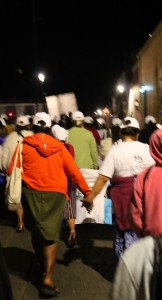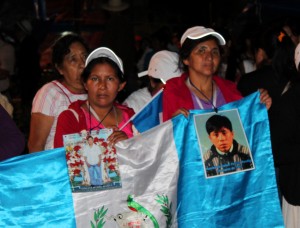 The central plaza of Oaxaca is plastered with posters and banners denouncing one atrocity after another, the layers of social movements overlapping on every wall available. Ayotzinapa, the struggle of the Section 22 teachers union, the recent murder of a teenage girl. In this cacophony of protest, on Nov. 30, the Caravan of Central American Mothers Searching for their Disappeared Children arrived in the plaza and called for unity among the movements of Mesoamerica. Representatives of the teachers’ union, family members of disappeared Oaxacans and womens rights organizations accompanied the mothers, showing the growing convergence of movements.
The central plaza of Oaxaca is plastered with posters and banners denouncing one atrocity after another, the layers of social movements overlapping on every wall available. Ayotzinapa, the struggle of the Section 22 teachers union, the recent murder of a teenage girl. In this cacophony of protest, on Nov. 30, the Caravan of Central American Mothers Searching for their Disappeared Children arrived in the plaza and called for unity among the movements of Mesoamerica. Representatives of the teachers’ union, family members of disappeared Oaxacans and womens rights organizations accompanied the mothers, showing the growing convergence of movements.
Marta Sanchez, coordinator of the Mesoamerican Migrant Movement (MMM), said in her opening remarks, “All of our struggles should be one unified struggle, because all of these problems have the same root. Out with the bad government!”
Sanchez estimates that there are 70,000 to 150,000 disappeared migrants in Mexico, yet the government has no database or official national mechanism to search for them. Echoing the cries of “Because they were taken away alive, we want them back alive!” resonating across Mexico with the case of the 43 disappeared students of Ayotzinapa, the mothers chanted in downtown Oaxaca, “Because they came here alive, we want them back alive!”
Mothers unite to find their children
This year, in the tenth caravan, the group is traveling through ten Mexican states. The caravan began Nov. 20 in Tenosique, Tabasco on the border with Guatemala, headed north to Guadalajara, then through Mexico City and south to Oaxaca City. The Caravan concludes Dec. 6, after visiting the Isthmus of Tehuantepec, Oaxaca and San Cristobal and Tapachula, Chiapas. The southern states of Oaxaca and Chiapas are especially important because many of the Caravan members last heard from their loved ones from southern Mexico. Oaxaca is historically one of the Mexican states with the highest rates of migration.
So far the Caravan has united three participants with their family members. In every state they go through, Caravan participants visit migrant shelters, prisons and other locations in the search for people who might have information about their relatives.
The Tenth Caravan has focused on connecting with other civil society organizations. As one speaker described their mission, “The mothers come to embrace the rest of the movements of Mexico.” This year the Caravan decided not to pursue meetings with government officials. They say that after numerous meetings over the years, they have found only empty promises and now concentrate on working directly with other human rights organizations and on searching for the missing migrants themselves.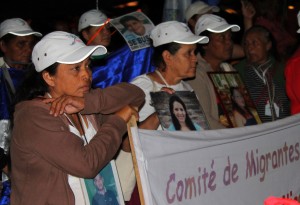
The MMM has succeeded in reuniting 200 migrants with their family members since its inception. While it is slow, painstaking work, that also involves traveling to remote locations in Central America to meet with families, they are convinced it is work worth doing. And everyday there are more mothers, fathers, sisters and brothers who are missing a family member who headed for “El Norte.” On receiving the Caravan in Oaxaca, Axela Romero of the Mesoamerican Initiative of Women Human Rights Defenders, said the caravan teaches Mexican society that, “No search is in vain.”
Lessons from the Mothers to Ayotzinapa
Romero commented, “We in Oaxaca have a lot to learn from this caravan, that has now lasted for ten years. They have been facing all of these problems that here we are just starting to face.”
The Caravan is not the only organization to search for disappeared people in Mexico, but it’s a remarkable example due to its level of organization in coordinating the travel of Central Americans to Mexico, and its ten years of experience. The mothers have found that the Mexican government 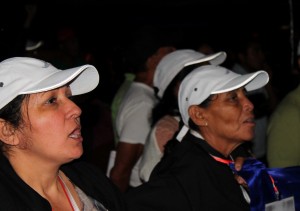 has little interest in finding their family members, so they have turned to civil society to take on the task. This mirrors the transition in the search for the Rural College students of Ayotzinapa, whose parents and family members have frequently cut off negotiations with the government and initiated their own search efforts. The Central American mothers demonstrate that when the state has no interest in finding the thousands of people disappeared within its borders, civil society can take on the task, fueled by the pain and love a mother feels for her missing child.
has little interest in finding their family members, so they have turned to civil society to take on the task. This mirrors the transition in the search for the Rural College students of Ayotzinapa, whose parents and family members have frequently cut off negotiations with the government and initiated their own search efforts. The Central American mothers demonstrate that when the state has no interest in finding the thousands of people disappeared within its borders, civil society can take on the task, fueled by the pain and love a mother feels for her missing child.
The Caravan reminds Mexico that the pain of Ayotzinapa goes beyond borders. Romero said, “Mesoamerica pains us, this region that forces its youth to leave their homes. Mesoamerica pains us, where the governments don’t know how to listen to the suffering of a mother.” She added that the Caravan mothers prove that it is not just Mexico that’s hurting. Migrants from Central and South America disappear in Mexico in alarming numbers and their families face extreme barriers to search for them. As more mass graves are uncovered around the country, it is not only Mexicans who are concerned, knowing it could be a loved one buried there.
Oaxaca, “a state that fights back”
Various speakers from Oaxaca joined the Caravan’s rally in the central plaza of the state capital, including representatives of the Oaxaca Network of Human Rights Defenders and a representative of the combative Section 22 of the CNTE teachers union, Coastal region.
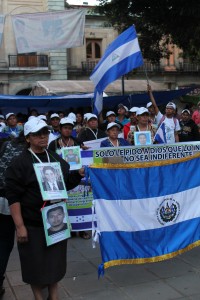 However, the mothers took center stage. Blanca Gomez from El Salvador spoke to the crowd. She is searching for her brother, disappeared four years ago, and her son, who disappeared one year ago.
However, the mothers took center stage. Blanca Gomez from El Salvador spoke to the crowd. She is searching for her brother, disappeared four years ago, and her son, who disappeared one year ago.
“It is difficult to be here,” she said, “But we represent many mothers who have stayed in our countries and they are hoping that we come back with an answer.”
From the central plaza, the group marched to the Plaza de la Danza to attend a concert to mark the sixteen days of action worldwide to end violence against women. The Institute for Oaxacan Women organized the concert. When the Caravan arrived they were invited to the stage. Sanchez and Gomez spoke to the hundreds of people in the audience about the mission of the Caravan. Sanchez added that the situation of female migrants is one of “double vulnerability,” because “the daughters that we don’t find–because we find more men than women–we know that they are victims of trafficking.”
In its tenth year, the mothers arrived in Mexico with the same message and the same demands the Caravan has carried since its inception: Find our children. Today those demands are shared by Mexican society, enraged by the Sept. 26th forced disappearance of the 43 youth in Iguala, Guerrero. Romero spoke for many along the way when she told the mothers, her voice filled with emotion, “Today we join your journey.”
